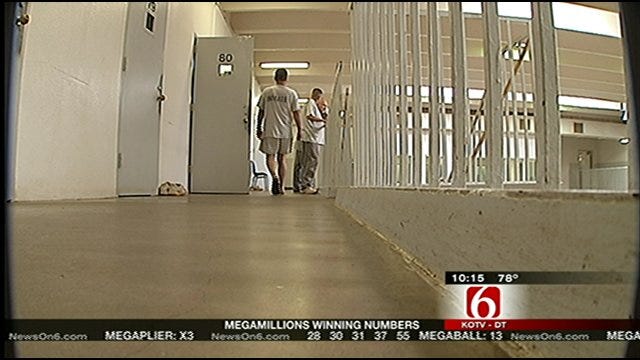State Agency Employees Question State Contract Prices
Some state employees are speaking out, expressing concern about mandatory state contracts. They argue items are sometimes overpriced and they're forced to spend tax dollars buying them.Tuesday, May 31st 2011, 9:50 pm
Amy Lester, Oklahoma Impact Team
OKLAHOMA CITY -- Some state employees are speaking out, expressing concern about mandatory state contracts. They argue items are sometimes overpriced and they're forced to spend tax dollars buying them.
"It's frustrating, you know. It makes you angry to see this," said Amanda Ewing, Executive Director of Oklahoma Corrections Professionals.
Ewing represents Department of Corrections' employees. She says DOC employees from different facilities, around the state, have contacted her about this pricing issue. They've shown her and us dozens of examples.
Like Quickkrete, one employee bought for DOC last year, on a mandatory state contract. The cost was three times higher than the price at a local lumber yard. The state's bag was 10 pounds smaller. A three-wheel cart was $663 dollars more through the state contract. More than one agency complained about toilet paper, saying it typically runs $10 higher.
A DOC employee tells us, buying elsewhere, could save one prison, more than $17,000 a year. The employees believe the state's mandatory contracts should have the cheapest price.
"Saving money will allow the Department of Corrections to put all their employees back to work full time and stop squandering dollars on overpriced goods from state approved vendors," said Ewing.
The OSBI has also noticed the price differences. The director received a list of hundreds of items that are cheaper on the open market. Buying there, instead of from state contracts would save around $100,000.
"The mandated state contracts have to be reviewed clearly," said Stan Florence, director of OSBI. "We end up spending more money in many instances than we have to, so that concerns us greatly."
The Department of Central Services negotiates the contracts. DCS can grant an exception for an agency to not buy on a mandatory state contract. Some state employees complain that the process is time consuming and their requests aren't always granted. DCS did allow OSBI to buy lab supplies from other vendors, and save $80,000. But, OSBI employees are concerned about other agencies still buying overpriced items from the mandatory contract.
Read OSBI's price comparisons for statewide contracts
"Some of these are rather blatant abuse of how much money is actually being spent for some of these items," said Florence. "We just think that there may be a better way to do this especially when agencies are looking at furloughing employees and reducing services that really the citizens need."
The Department of Central Services negotiates contracts in different ways. If there are a lot of items, they negotiate the price for the most used items and discounts on others. If an item is on a State Use contract, it's a different story. Those contracts are awarded to organizations who employ disabled Oklahomans. A committee comes up with the fair market value and sets an item's price. State employees have complained to us about the system, saying many times, the items are overpriced.
Read OSBI's price comparisons for state use contracts
We sat down with the State Purchasing Director for DCS, to get his take on the situation.
"Price is normally the most important item, but, if price is the only factor we're looking at, we could be dismissing a whole host of other things that are very important to the agency," said Scott Schlotthauer, State Purchasing Director for DCS.
The agency can renegotiate an item mid-contract, if necessary. While Schlotthauer says it does happen, it's unclear how often that occurs.
"That is a privilege we do not want to abuse but, when we see that market conditions have changed, they have improved, then we expect suppliers to come back and give the state benefits of that," said Schlotthauer.
The agency is in the process of modernizing. Two independent consultants did some analysis and helped identify ways to save money. Some of the suggestions have been implemented, others are in the process of being put in place.
By renegotiating contracts last year, Schlotthauer says they saved the state at least $8 million. He says the state can accomplish larger overall savings by using its leverage to work as a whole, instead of as individual agencies.
"By acting together, we can obtain a much better benefit then by each person doing what is right for them at that particular time," said Schlotthauer.
Several agency heads approached Representative Lisa Billy about the overpricing problem.
"It was shocking to me," said Billy. "I thought, well, they're probably talking about 10, 20, 50 dollars, which is still very important, but, I didn't realize it was some of the discrepancies that I've now seen."
Billy is working with State Representative Jason Murphey to hold an interim study on this issue over the summer.
"We want to use that taxpayer dollar, the best way we know how to use it," said Billy. "That's my goal, ultimately, to make sure that every tax dollar is going as far as it can."
When we told Governor Fallin about what we found, her staff set up a meeting with DCS to discuss purchasing practices. Fallin also asked her cabinet to look for examples of overpaying or waste and let her know about it.
"It is disturbing and unacceptable whenever instances of government waste are uncovered. In order to eliminate waste and ensure that our state government is operating as efficiently and effectively as possible, I have asked lawmakers to pass a bill that will consolidate various state agencies - including the Department of Central Services - into the Office of State Finance. Combining these agencies will not only eliminate duplication and streamline services, it will also give my administration a more direct role in overseeing operations and demanding accountability from our government."
Fallin has since signed that bill into law. It's unclear at this point, what that means for DCS. The purchasing director assures us, he'll investigate what we found. We'll keep you posted.
More Like This
May 31st, 2011
January 2nd, 2025
September 29th, 2024
September 17th, 2024
Top Headlines
January 18th, 2025
January 18th, 2025
January 18th, 2025
January 18th, 2025













